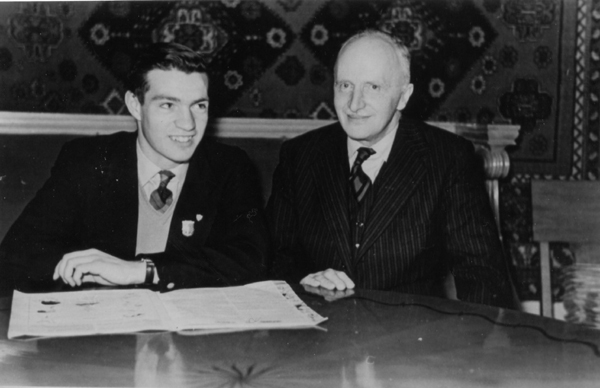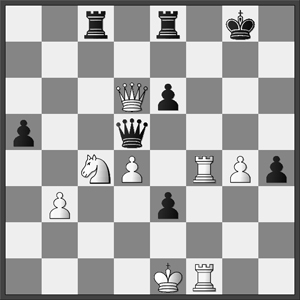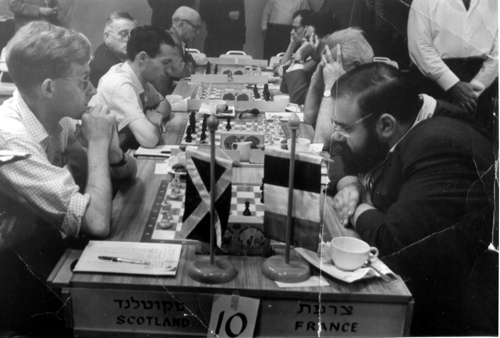
|
|
|
Michael Fallone
Photographs courtesy of Michael Fallone, except where stated.
Compiled by Alan McGowan
Michael Fallone was born in Bellshill on 23 November 1938. He showed great promise as a junior player and, as such, he represented Scotland in Glorney Cup competitions between 1952 and 1957, and won the Glasgow Boys' (Under Eighteen) Championship for 1954 with a clean score of 8 wins.
Glorney Cup 1952, held in London. Michael can be seen sitting in the front, third from right. Directly behind him is P.B. Anderson, who did so much to promote Junior chess in Scotland.
Glorney Cup 1956, Liverpool. Michael is in the front row, standing, 3rd from right. Beside him, 2nd from right, is William Ritson Morry, player, arbiter and organiser in England over many years. Beside him, far right in the same row, is P.B. Anderson. Other members of the Scottish team were George Dickson (back row, 2nd from left, who scored 3/3), J. Hennigan (5th from right in same row as Fallone - his son Michael won the British Championship in 1993), J.A. Phillips, P. McLaren and J. O'Sullivan.
Scotland v England
Michael played for Scotland against England in the matches in 1955, 1958 and 1962. In the first of these he reached his 17th birthday a few days before the match was played, and celebrated by defeating Haygarth.
Fallone - Haygarth Scotland v England 1955 (Bd 7) 1.d4 Nf6 2.Bf4 g6 3.e3 Bg7 4.Nf3 d6 5.Nbd2 Nbd7 6.c3 0-0 7.Bd3 Re8 8.Nc4 c6 9.Qc2 b5 10.Ncd2 Qb6 11.0-0 Bb7 12.e4 c5 13.d5 a6 14.c4 Ng4 15.h3 Nge5 16.Nxe5 Nxe5 17.Bxe5 Bxe5 18.f4 Bg7 19.f5 a5 20.Kh1 Ba6 21.Rab1 bxc4 22.Nxc4 Bxc4 23.Bxc4 Reb8 24.Qf2 Bd4 25.Qf3 Bf6 26.fxg6 hxg6 27.g4 Qb4 28.b3 Rf8 29.a4 Qd2 30.Rf2 Qg5 31.h4 Qxh4+ 32.Rh2 Qg5 33.Qh3 Rfb8 34.Rf1 Bg7
35.e5!! Qxe5 Just what else is there? White threatens 36 e6 f6 37 Qh7+ Kf8 38 Rf3, after which the double threat is R(f)h3 followed by Qh8+, mating speedily or, if the Queen leaves its protection, Qxg6 and mate at f7. [35...Bxe5 36.Qh7+ Kf8 37.Qxf7#;35...dxe5 36.d6!! e6 37.Bxe6! etc] 36.Qh7+ Kf8 37.Qxg6 Ke8 38.Rxf7 Kd7 39.Qxg7 Qe4+ Here, the game was adjourned, but Haygarth, after ascertaining that his checks soon exhaust themselves, resigned.
NOTE: The Glasgow Herald gave the following additional moves. 40.Kg1 Qe3+ 41.Rhf2
Scottish Championships
He competed in several Scottish championships. In 1956 the championship was held in his home city of Dundee, and their were high hopes locally for success. As it was, the experienced Dr J.M. Aitken took the title with 8½/9 in an all-play-all tournament, but Michael captured second place with 7 points, without loss. This was a fine result, considering his age.
A newspaper cutting about the Scottish Championship 1956, with emphasis on the youngest competitors. George Dickson finished in 4th place with 5½ points.
Here is an interesting draw between the two young challengers.
Fallone - Dickson Scottish Championship (4), 1956 Comments by Dr Aitken in the BCM 1956, page 232.
1.d4 d5 2.Bf4 A favourite line of Fallone's. 2...Nf6 3.Nf3 e6 4.e3 Bd6 5.Ne5 0-0 6.Nd2 Nfd7 7.Ndf3 f6 8.Nxd7 Bxd7 9.Bg3 Bc6 This loses time. Better is an immediate 9..Qe7, aiming at ...e5 as soon as possible. 10.Bd3 Qe7 11.Nh4 Be8 12.f4 f5 13.Nf3 Nd7 14.Bh4 Qf7 15.g4! The storm signals are now up but Dickson defends sensibly and forcibly.
15...Be7 16.Bxe7 Qxe7 17.Rg1 c5 18.c3 cxd4 19.exd4 Nf6 20.gxf5 exf5+ 21.Ne5 Bh5 22.Qb3 Ne4 23.Bxe4 Qh4+ 24.Rg3 fxe4 25.Qxd5+ Kh8 26.Qxb7 Bg6 27.Nxg6+ hxg6 28.Qd5 Qxh2 29.0-0-0! Very ingenious but Black has just got a defence. 29...Rab8 30.b3 Rf5 31.Qd6 Qxg3 This leads to a draw. With 31...Rb6 32.Qd8+ Kh7 Black could have tried for a win but at some risk. 32.Qxb8+ Kh7 33.Rh1+ Rh5 34.Rxh5+ gxh5 35.Qe5 Qxc3+ 36.Kb1 ½-½In the 1957 Scottish Championship, Michael scored 6½/9 to finish in joint 2nd-4th places with George Dickson and N.A. Macleod. The winner was Dr Aitken with 8.
In the 1958 event, Dr Aitken won again with 10/11, and this time Michael's great junior rival, George Dickson took clear 2nd place with 9½. Michael finished with 7½ to share 3rd and 4th places with N.A. Perkins. Michael's score was interesting; one draw against Aitken, 7 wins and three successive losses, in rounds 6-8.
Michael did not compete in the event over the next four year, but returned triumphantly to win the Scottish Championship in 1963 with a score of 6½ points in the seven round Swiss tournament, ahead of Ken McAlpine with 6, and fourteen others. In his report of the tournament for the British Chess Magazine, Dr J.M. Aitken stated about Fallone:
"His main characteristic is a tactical resourcefulness that is often apt to draw or even win a lost position and this trait stood him in good stead once or twice in this tournament."
The round 2 game between McAlpine and Fallone would prove crucial. This is the position after Black's 40th move, as given in the Scottish Chess Association Bulletin No. 11, May-September 1963.
McAlpine - Fallone
Scottish Championship (2), 1963
The bulletin gives the game continuation as ...1.Bd3 Kc5 2.Nc2 h4 3.Bf5 [3.Ke1 h3 4.Kxf2 h2] 3...Rh2 4.Ne1 [4.Ke1 h3 5.b4+ (5.Kf1 Rxc2 6.Bxc2 h2) 5...Kb6 6.Nd4 Rd2 7.Nxf3 (7.Kxd2 h2) 7...h2 8.Nxh2 Rxh2 wins.; Or 4.Bg4 Rh1+ 5.Kd2 f2]
4...Rh1 5.Kd2 h3 6.Nxf3 [6.Nd3+ Kd4 7.Nf2 (7.Bg4 Rh2+) 7...Rh2 8.Ke1 Rxf2 9.Kxf2 h2; Or 6.b4+ Kb6 7.Nd3 h2 8.Nf2 Rf1] 6...h2 7.Nxh2 Rxh2 "and wins".
Michael Fallone played in three Olympiads for Scotland: Moscow 1956, Tel-Aviv 1964 and Havana 1966. He provided some personal comments about his Olympiad chess career, which were incorporated in an article that appeared in Scottish Chess No. 174, June 2001. This material is now used again, but with the addition of a selection of photographs that did not appear with the original article.

Michael Fallone (left) and Col. W.G. Irvine-Fortescue, who accompanied the Scottish team as an official.
Remaining true to his style.
When Michael Fallone was preparing to take part in the Scotland v France match in round 7 of the Preliminaries at the Tel Aviv Olympiad of 1964, he faced a personal dilemma.
"Up until this point any good games I'd played had been against British players so when I played abroad, I was expecting a different – if not stronger – type of chess. I therefore tried to alter my style to suit the continental game. This was disastrous for me, because I was playing a completely alien style to my usual. My record abroad up until this game was: played 14; drawn 5; lost 9. [11 games at Moscow 1956 and 3 games in the preliminary rounds at Tel-Aviv - AMcG]
"No wonder my confidence was almost zero.
"This match against France was the final match of the preliminaries, and as such Scotland had to win by a score of 3-1 to qualify above France for the ‘B’ Final. On paper, we had no chance of winning this, so as my record was dismal, and the team had nothing to lose, I asked my captain if I could play my normal style. He agreed, and I played for the first time my normal, aggressive game against continental opposition. My opponent was obviously 'put out' by this style, and I managed to win in 33 moves.
"To me this was more than a positive result, as it showed me that my type of chess could stand on its own against most players."
This wasn't a brilliant game, but it did give me the confidence I lacked."
[Incidentally, Scotland did surprise everyone by winning against France 3-1, thanks to a 91 move win by Fairhurst v Boutteville, and draws by Dr Aitken v Mazzoni and Baxter v Zinser - AMcG]
Thiellement - Fallone Tel-Aviv Olympiad 1964
(Preliminary Round 7) QP Richter-Veresov Opening
1 d4 d5 2 Nc3 Bf5 3 f3 e6 4 e4 Bg6 5 exd5 exd5 6 Qe2+ Be7 7 Qb5+ Nc6 8 Nxd5 Nf6 9 Ne3 0-0 10 c3 a6 11 Qb3 Re8 12 Ne2 Na5 13 Qa4 c5 14 Nf4 b5 15 Qd1 Qc7 16 Nxg6 fxg6 17 Kf2 Rad8 18 Bd2 cxd4 19 cxd4 Rxd4 20 Bxa5 Rxd1 21 Bxc7 Rxa1 22 Bb6 Rxa2 23 Be2 Rxb2 24 Ra1 Nd5 25 Nxd5 Rxe2+ 26 Kf1 Bh4 27 g3 Bf6 28 Rxa6 Re1+ 29 Kg2 R8e2+ 30 Kh3 Rh1 31 Ra8+ Kf7 32 Ra7+ Ke8 33 Kg4 h5+ 0-1
The photo above shows the crucial match in progress. Nearest camera on the left is Baxter v Zinser, then Fallone v Thiellement, Dr Aitken v Mazzoni and Fairhurst v Boutteville.Michael went on to score a further six wins, recording the best overall score of the Scottish players at Tel- Aviv.
The Scottish team at Tel-Aviv 1964. From left to right: M. Fallone, G. Bonner, A. A. Thomson, W. A. Fairhurst, Dr J. M. Aitken, R.W.M. Baxter.
Opening Choices
Fallone was, for the most part, comfortable with a limited opening repertoire. With the white pieces he consistently played a system with 1 d4 and 2 Bf4, something that could be utilised against almost any defence. Indeed, such was this system’s popularity with Scottish players of the day that it was also played by Fairhurst, Ken McAlpine, Gerald Bonner and Hugh Holmes.
This quiet-looking system had the benefit of allowing for a solid development with few targets of attack for the opponent, but at the same time often permitted Fallone’s sharp tactical ability to turn the game into an onslaught against the enemy’s kingside. A great familiarity with the setup would also have allowed for increased confidence and, no doubt, the saving of time on the clock.
Correspondingly, as Black, he often played 1…d5 and 2…Bf5 against QP openings, one example of which is given above. Also, he was happy to allow the Ruy Lopez so that could play his favourite Bird’s Variation 3…Nd4, thereby provoking a sharp battle.
Havana Olympiad 1966
Fallone was once again selected for the Scottish team and it was not long before his aggressive style of play was making itself felt on board two.Undeterred by a short, sharp opening round loss, Fallone rolled out his 1 d4 2 Bf4 system in round two against the East German Grandmaster Pietzsch, scoring a hard-fought win in 60 moves.
Wolfgang Pietzsch, at the Havana Olympiad 1966. From the Sportverlag book of the event.
Fallone - Pietzsch Havana Olympiad 1966 (Prelimininaries, Round 2)
1.d4 Nf6 2.Bf4 g6 3.e3 Bg7 4.h3 d6 5.Nf3 0-0 6.Nbd2 Nbd7 7.Bc4 c5 8.c3 b6 9.0-0 Bb7 10.Qb3 h6 11.a4 a6 12.Bh2 Rc8 13.Nh4 d5 14.Be2 e6 15.Nhf3 Re8 16.Ne5 Nxe5 17.Bxe5 Nd7 18.Bxg7 Kxg7 19.f4 Qc7 20.Rf2 Nf6 21.Qc2 Ne4 22.Rf3 f5 23.g3 Ra8 24.Kh2 Kh7 25.Rg1 Rg8 26.Qd1 g5 27.Rff1 Rg7 28.Nf3 Rag8 29.Qe1 a5 30.Ne5 Bc6 31.Bd1 Be8 32.g4 The tension now breaks, making the game very complicated.32...gxf4 33.Rxf4 Qe7 34.Bc2 Kh8 35.Rff1 fxg4 36.hxg4 h5 37.Bxe4 dxe4 38.Rf4 Qg5 39.Qg3 Rh7 40.Kg2 Qe7 41.Kf1 h4 42.Qh3 cxd4 43.exd4 b5 44.axb5 Bxb5+ 45.c4 Qb4 Black thinks this sacrifice wins, but it seems only good enough for a draw. 46.cxb5 Qxb5+ 47.Ke1 Rc8 48.Qa3! Threatening Rf8+, and showing that 47...Qxb2 was better. 48...Kg8 49.Rgf1 Re7 50.b3 Not 50.Qxe7 Rc1+ winning. 50...e3 51.Nc4 Ree8 52.Qd6! Qd5 If 52...Qxb3 53.Rf8+ Rxf8 54.Qxe6+ Kg7 55.Qe7+ Kg8 56.Qg5+ Kh8 57.Qxh4+ Kg7 58.Qg5+ Kh7 59.Rh1 mate.

53.Rf5! A delightful follow-up to 52.Qd6! 53...Qxd6 54.Rg5+ Kh7 55.Nxd6 Rc1+ 56.Ke2 Rxf1 57.Nxe8 Rb1 58.Nf6+ Kh6 59.Rg8 Rb2+ 60.Kxe3 Black resigns.
The threat of g5 mate is crushing. A brilliant game by Fallone against a Grandmaster.
"I was naturally elated after the game", said Michael, "but what made my day was that Larsen, the Danish Grandmaster, went out of his way to approach me, later on that day, and offer his congratulations. This was indeed a terrific gesture on his part."
Following a draw in round three, Fallone once again had the opportunity to play his favourite system in the match against Italy.
"I'd often wondered how I would play if ever Scotland were drawn against Italy. My grandfather was Italian, and I didn't know where my loyalties would lie.
"The following game shows that my fear of defeat overcame my fear of not playing well because of divided loyalties."
Fallone - Cappello (Italy) Havana Olympiad 1966 (Preliminaries, Round 4)
Notes by W.A. Fairhurst in the Glasgow Herald
1 d4 Nf6 2 Bf4 d6 3 e3 g6 4 h3 Bg7 5 Nf3 c5 6 c3 Nbd7 7 Nbd2 Fallone is now the leading exponent of this system of meeting the King’s Indian Defence. It was first introduced in international play by Capablanca against Reti at the London tournament of 1922.
7…0-0 8 Bc4 Rb8 9 a4 a6 10 Qe2 cxd4 11 exd4 The alternative is 11 cxd4, with possible play on the c-file.
11…Nb6 12 Bb3 Nbd5 13 Bg5 The bishop is better placed on the diagonal h2-b8, but if 13 Bh2 then 13…Bh6 with advantage to Black. If White had chosen 11 cxd4 he could now have played 13 Bh2 without losing control of f4.
13…h6 14 Be3 Be6 15 0-0 b5 16 axb5 axb5 Black has obtained a satisfactory game, but White is able to exert pressure on the king’s file.
17 Bc2 Nh5 18 Nh4 Qd7 19 Rfe1 Bf6 This allows White to embark on a complex counter-combination. 19…Nhf6 was better.
20 Bxg6 Nhf4 21 Bxf4 Nxf4 22 Qe4 Bxh4 23 Qxf4 Bg5 24 Qg3 fxg6 If 24…Bxd2 then 25 Bc2+ Kh8 (or 25…Bg5 26 h4) 26 Qd3 with advantage.
25 h4 Bxd2 Black’s best chance was 25…Rf5 26 Ne4 Rbf8 27 hxg5 h5 etc.
26 Qxg6+ Kh8 27 Rxe6 d5 Or 27…Bf4 28 Rae1 Rbe8 29 R(1)e4 Bc1 30 Rg4 Rg8 31 Qxh6 and mates next move. Or 27…Rg8 28 Qe4 Rg7 29 Rd1 Rbg8 30 Rxd2 Rxg2+ 31 Kf1 and wins.
28 Rae1 Rf6 If 28…Bxe1 29 Qxh6+ Kg8 30 Qg5+ and mate next move. Or 28…Rg8 29 Qf5 and wins.
29 Rxf6 exf6 30 Re2 Bc1 31 Rc2 Rg8 32 Qxf6+ Kh7 33 Rxc1 Qg4 34 g3 Rg6 35 Qf7+ Rg7 36 Qxd5 Re7 37 Ra1 Black resigns.
The Psychological Side of Chess
Scotland was drawn against Finland in round 12 of the finals and as a result of Fairhurst’s ill health, Michael was scheduled to appear on board one.
"Judging by the board positions in earlier rounds, there was every chance that Westerinen and I should meet. He had obviously done his homework and had noticed that I had always played 1. d4 as my opening move. I had done my preparations as well, and had noticed that Westerinen had played the Sicilian defence against 1. e4, and as I was more than keen on playing the Wing Gambit, which suited my all-out attacking style, I was hoping that he would play this opening in our game.
"When I opened the game with 1. e4, it obviously came as a shock to him because he took 25 minutes for his first move, before deciding on his usual 1...c5. When I played b4 in reply (second shock for him), he then took another 40 minutes before making his second move.
I, then, just had to make the game complicated, and he would have much less time than me to study the complications."
Fallone – Westerinen (Finland) Havana Olympiad 1966 (‘B’ Final, Round 12)
Sicilian Defence, Wing Gambit
The following notes incorporate analysis by Craig Pritchett in Scotland’s Chess Centenary Book.
1 e4 c5 2 b4 cxb4 3 Bb2 d5 4 exd5 Qxd5 5 c4 Qd8 5 ..Qe4+ 6 Be2 Qxg2 7 Bf3 Qg6 8 d4 would require even steadier nerves.
6 d4 Nf6 7 Bd3 e6 8 Nf3 Be7 9 0-0 0-0 10 Nbd2 Nc6 11 Re1 b6 12 Ne4 Bb7 13 Rc1 Rc8 Black has played very sensibly and it is not easy for White to work up any real initiative.
14 Re3 Nxe4 15 Rxe4 Bf6 16 Rg4 Re8!? But hereabouts Black begins to drift. He sets his mind on an unsound advance in the centre. The conservative 16...Ne7, to transfer his Kt to g6 or f5 looks much better.
17 h4 e5? 17...Ne7 still seems best.
18 d5 e4!? Unfortunately, if 18...Nb8 or 18...Na5, 19 Ng5 gives White real attacking chances. However, the text move gives back the gambit pawn and leaves White with a clear positional advantage.
19 Bxf6 Qxf6 20 Bxe4 Na5 21 Ng5 h6 After 21 ..g6 22 Bd3 Black is also much worse.
22 Nh7 Qd6 23 Qf3 Rxe4!? Black gives up the exchange in the hope of catching White's knight in the corner. If 23...Re5 24 Qg3 is very strong.
24 Qxe4 g6
Hugh Holmes, also a member of the Scottish team, was not playing in this match but was a spectator. The captain of the team, Fairhurst, was ill and in bed that day, so Hugh gained entry to the playing hall by saying he was non-playing captain for the day. Word spread around the tournament hall concerning this game and such was the interest shown that the spectators were about six deep around the board.
25 Qf5 Kg7 26 h5 Nxc4 26 ..g5 27 Nxg5 and White's attack is overwhelming. 27 hxg6 fxg6
28 Re1 Threatening 28 Re6 and 28 Rxg6+. Now the game is effectively over.
28 ..Ne3 29 fxe3 And not 29 Rxe3 Rc1+ and it is Black who is winning!
29 ..Rg8 30 Qf4 Qd8 31 Rc1 Kxh7 32 Rh4 g5 33 Rc7+ Rg7 34 Qf5+ Kg8 35 Qe6+ Kf8 36 Rxh6 Black resigns.
A fine victory against a player who had an excellent score in this Olympiad (+12, =5, -3) and who would go on to gain his IM title the following year.For those readers who may be interested in further examples of Michael Fallone’s play, please see the collection of Olympiad games on the Chess Scotland website.
Alan McGowan (with thanks to Michael Fallone for his personal observations)
